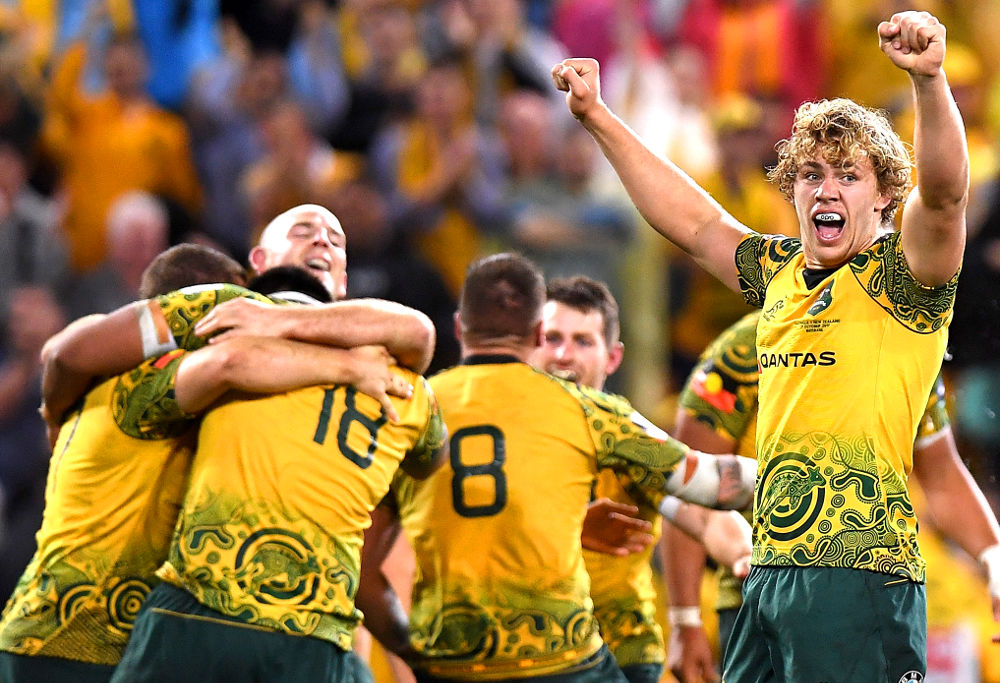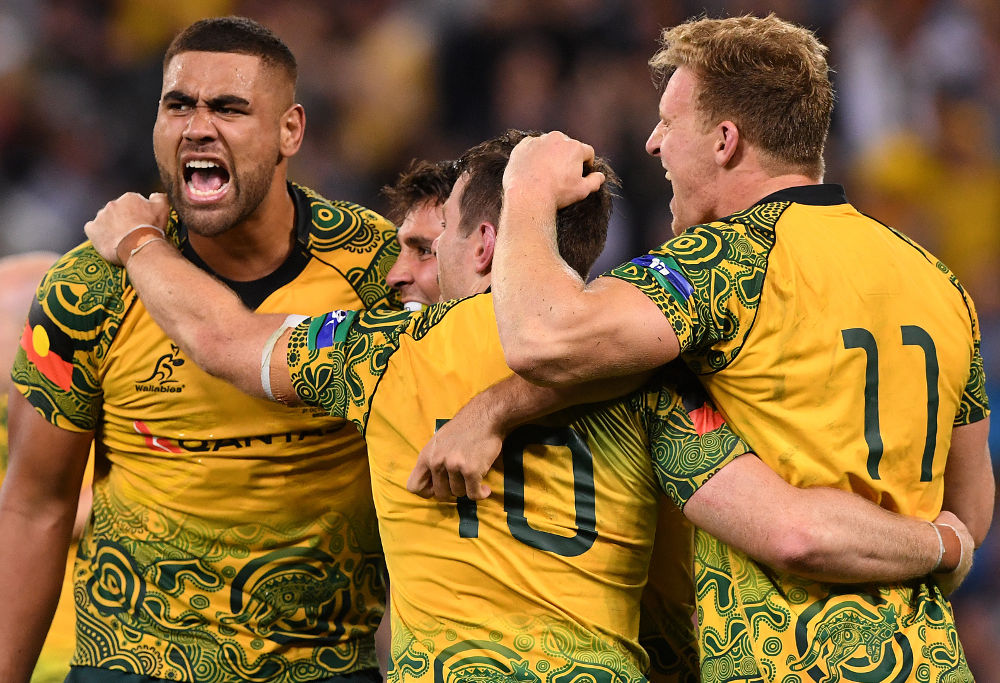Michael Cheika was thoughtful and considered when he summed up the Wallabies’ splendid 23–18 victory against an uncharacteristically niggly, error-prone All Blacks side at Brisbane’s Suncorp Stadium on Saturday night.
“I am happy for the players,” he told reporters, “because they have been working very hard.”
This was the right response from the Wallabies coach. It is the players, after all, who have to actually play the Test. In this Test, the Wallabies played with an intensity, especially on defence, and a rugby nous that was superior to that of the All Blacks.
They had the resilience and courage, too, to hold off the traditional All Blacks surge in the final minutes of the Test when the visitors were pressing for another of their trademark Perils-Of-Pauline escape from the oblivion of defeat.
In the crucial middle section of the second half, the All Blacks gave away seven successive penalties. And towards the end of the Test, when they needed a penalty and then later a converted try to win, they continued with some stupid off-the-ball play that gave away penalties and stopped two promising attacks in their tracks.
The Test ended when Sam Cane knocked-on during a pick and drive attack just inside the Wallabies 22 that had the potential for a winning try under the posts.
What does not destroy a team can make it stronger. This seems to be the message the Wallabies gave to the All Blacks in those crucial final minutes of the Test.
Teams playing Test rugby perform at the level their opposition allows them to. The Wallabies, on attack and defence, did not allow the All Blacks to play their usual all-skills, high-tempo ensemble game. For once, they won the battle of the advantage line. And they built this advantage into a famous ‘Pure Gold’ (according to a Sun-Herald headline) victory.
The All Blacks became increasingly rattled. Some of the players, especially Dane Coles, totally lost the plot and resorted to cheap obstruction tactics and verballing of Wallabies who had got under their skin.
One of the golden rules of sport is that you lose the game when you lose your composure. When this loss of composure leads to a run of penalties against your side, it is difficult to win a Test. This is what happened to the All Blacks. They lost the mind game and, as a consequence, lost the game.
The Wallabies won the battle of composure and this victory enabled them to score the last three points (a long-range penalty by my man of the match Reece Hodge) in the 78th minute that entrenched the win.

Cheika also made another important point during his impressive media conference: “But the end game is to bring home the Bledisloe Cup and we came short there this year. So as enjoyable as the win was, not winning the Cup resonates with me.”
This is a smart assessment. It is generally hard for any dominant sports team to win a one-off Test when it has already won the series. Motivation to win trophies is the engine that drives successful teams. It is hard in sport (think of Steve Waugh’s dominant Australian Test sides) to invariably play with a winning intensity when the series victory has already been recorded.
The All Blacks had won the Bledisloe Cup. Moreover, the team was without Beauden Barrett, Brodie Retallick (a critical loss), Ben Smith, Owen Franks, Joe Moody and Nehe Milner-Skudder, all players who would be expected to be in the starting line-up. As Paul Cully pointed out in the Sydney Morning Herald, Israel Folau had twice the number of caps of the All Blacks back three combined.
But even with the inexperience of the All Blacks side being conceded, it is difficult not to enthuse about the quality of the Wallabies’ victory, their first against the All Blacks since 2015.
It seems to me that this win has resonances of the third Test victory against the All Blacks in 1990, after losses in the first two Tests, a win that foreshadowed the triumph in the 1991 Rugby World Cup victory.
I say “resonances” because the All Blacks, at this stage in the Rugby World Cup 2019 cycle, remain the favourites to win the tournament.
But, and this is the crucial points in my view, the Wallabies have turned the corner after a dismal run earlier this season and throughout last year. They are in their best position now to make a successful run to the finishing line since their defeat in the final of Rugby World Cup 2015.
The first point to make in an assessment of the meaning of the Brisbane victory for the Wallabies is that the difficult conditions did not favour their ball-in-hand game. The team now has the has given belief that they can beat the All Blacks.
You could see the relief and enthusiasm for what they had achieved in the celebrations of the players when the final whistle had sounded.
Paul Cully had an interesting article in the Sydney Morning Herald, ‘Australian rugby has been traumatised by the All Blacks’, where he suggests that losing to the All Blacks has become a habit, and a bad habit at that:
“Every Wallabies player who puts on the jersey get compared not just with his peers but with an All Black from an era of unusual dominance … I think it has broken some players. They think they wouldn’t get into that team. I also think they are under-selling themselves, but it’s what they think that counts.”
Interestingly, Cully used Jack Dempsey as an example of a player not rated by Wallabies supporters as being a match for Jerome Kaino or Liam Squire.
Guess what happened in the Test? Dempsey was awarded the man of the match for his sterling performance in a pack that more than matched the All Blacks in physicality and skills.
Cully also suggested that the three-Test system, in place for Bledisloe Cup Tests until 2021, should be reduced to two Tests.
I can’t agree with this. The three-Test system gives the Wallabies their best chance of winning back the Bledisloe Cup as it gives them three chances rather than two of winning two Bledisloe Cup Tests in a single year.

You have to go back to the 20th century to find examples of the Wallabies winning back-to-back Tests against the All Blacks.
The second point is that Michael Cheika has finally settled on a squad that can play the Cheika game of ball-in-hand on attack and aggressiveness on defence. The team that took the field at Brisbane was essentially the same side he has selected for the last three Tests.
Importantly, when Rob Simmons was injured, Lukhan Tui replaced him and showed that he is ready for a starting role in the pack.
Continuity of selection is crucial for a successful side. All the key positions are now nailed in place for the Wallabies. This means that when someone is injured a new player is more easily fitted into the side.
With the selection of Marika Koroibete, the Wallabies finally (after Israel Folau was shifted from wing to fullback) have a winger who is a genuine finisher. The Folau–Koroibete combination, in fact, gives the Wallabies two finishers who are about as good as anyone in world rugby.
Having finishers like this is the equivalent of a power serve in tennis. You get easy points from time to time with one-serve aces instead of having to grind out all your points and risk making a mistake, as the All Blacks did several times close to the Wallabies line.
I came across an interesting article by William van Rensberg, a South African who has lived in New Zealand and now lives in Australia, titled ‘The number that’s against the All Blacks’.
Van Rensberg noted that the bookmakers were picking a 14-point margin for the All Blacks which, in his opinion, was wrong. “I would not be surprised,” he wrote, “if the Wallabies bag this one.”
His reasoning was that the All Blacks’ performances have deteriorated in 2017 over what they achieved in 2016: “The All Blacks are currently scoring fewer tries for every try conceded, or to put it differently, they are letting more and more tries in for every try they score themselves.”
By way of contrast, “the Wallabies have been able to improve their tries scored to conceded from 2016 to 2017. They clearly have improved both their attacking and defensive abilities.”
Wayne Smith in the Australian on Saturday pointed out, reinforcing the argument made by van Rensburg, that the Wallabies have scored as many tries in nine Tests in 2017, 39, as they scored in 15 Tests last year.
On Saturday night it Brisbane, this ratio of an improving Wallabies scoring pattern and a deteriorating All Blacks one played itself out as the home side scored three tries to the two scored by the visitors.
So what we now have is a Wallabies side on the rise and an All Blacks side on the decline.
The real issue is whether the low base the Wallabies are rising from will bring them anywhere near the high point the All Blacks are seemingly declining towards.































































































